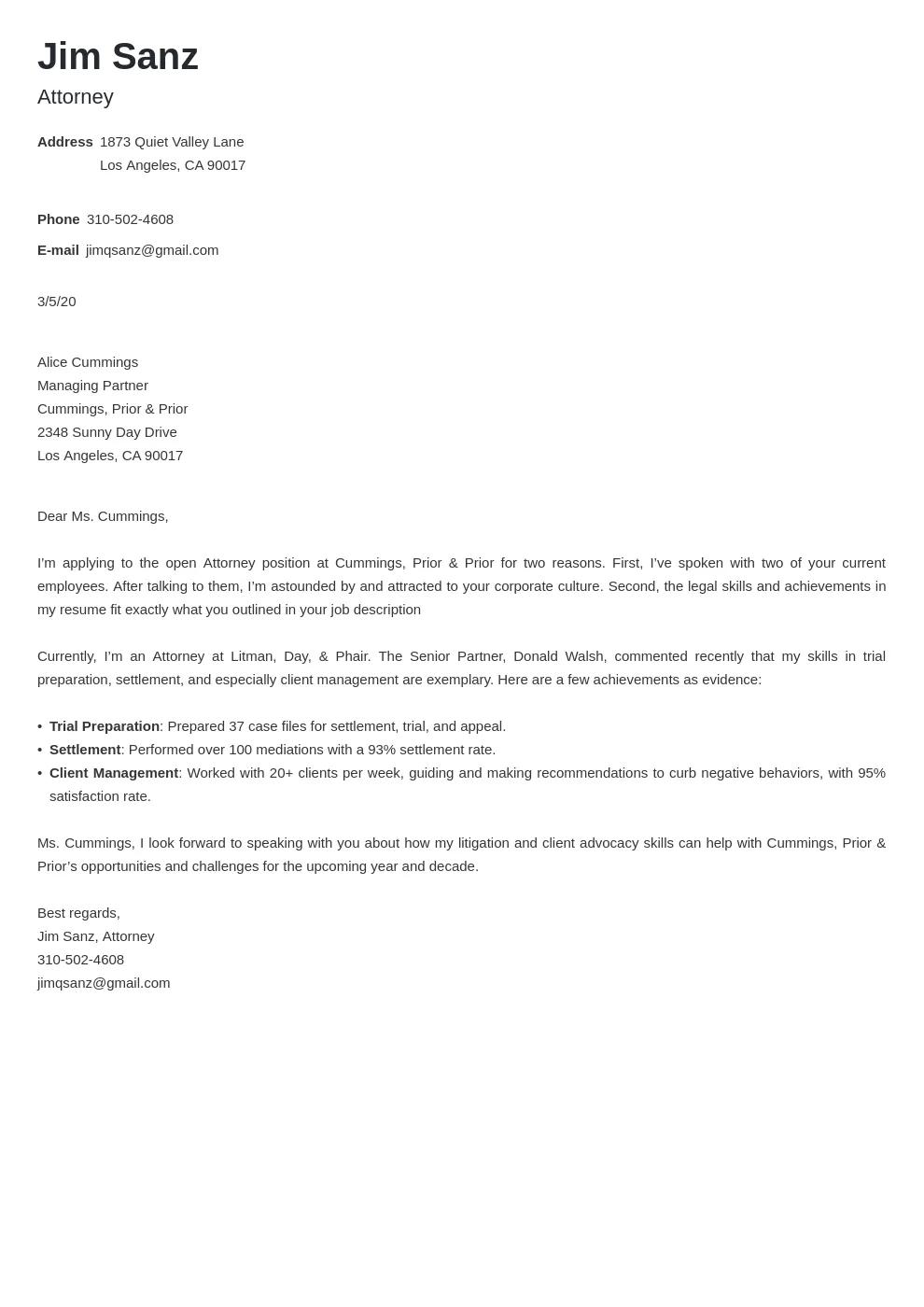The Power of Attorney Cover Letters
In the competitive world of law, a compelling attorney cover letter is your first opportunity to make a lasting impression. More than just a formality, it’s your chance to showcase your unique qualifications, enthusiasm, and understanding of the role. It’s a critical tool in securing that coveted interview and ultimately, landing your dream job. A well-crafted cover letter doesn’t just reiterate your resume; it breathes life into your professional story, highlighting your accomplishments and demonstrating your genuine interest in the position and the firm. This initial document is often the deciding factor in whether a hiring manager will delve deeper into your qualifications or move on to the next candidate. That’s why mastering the art of attorney cover letter writing is essential for any legal professional looking to advance their career.
Why Your Attorney Cover Letter Matters
The importance of an attorney cover letter cannot be overstated. It’s the first impression, the introduction, and the initial pitch all rolled into one. A strong cover letter provides context to your resume, explaining why you’re the perfect fit for the specific role and the firm’s culture. It allows you to elaborate on your skills, experience, and motivations in a way that a resume, with its concise format, simply cannot. A well-written cover letter sets you apart from other applicants by demonstrating your personality, your communication skills, and your understanding of the legal profession. It signals to the hiring manager that you’ve taken the time to understand their needs and are genuinely interested in the opportunity.
Understanding the Purpose of a Cover Letter
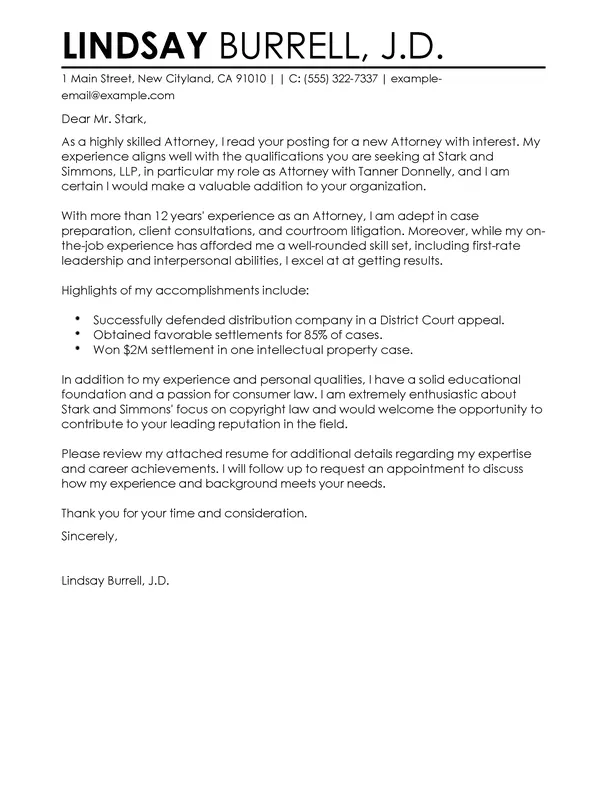
The primary purpose of an attorney cover letter is to persuade the reader that you are a strong candidate for the position. It’s not just a summary of your resume; it’s a targeted marketing document that highlights the most relevant aspects of your experience and skills. It should showcase your enthusiasm, your knowledge of the firm, and your understanding of the legal field. The cover letter provides an opportunity to demonstrate your writing and communication skills, which are critical in the legal profession. By clearly articulating your value proposition, you can significantly increase your chances of securing an interview and ultimately, the job. It’s your chance to show the hiring manager why you, and not someone else, should be brought in for an interview.
Top 5 Attorney Cover Letter Secrets
Unlocking the secrets to a successful attorney cover letter can significantly boost your chances of landing an interview. These secrets go beyond basic writing tips and delve into strategies that will help your application stand out. By focusing on these key areas, you can create a cover letter that captivates the reader and effectively communicates your qualifications. From highlighting your key skills to tailoring your letter to the specific role and firm, and demonstrating your accomplishments, these are the strategies that will make your application shine. Let’s explore the top 5 secrets to writing an attorney cover letter that gets results.
Secret 1 Highlight Your Key Skills
When crafting your attorney cover letter, it’s crucial to showcase the skills that directly align with the job requirements. Identify the key skills mentioned in the job description and explicitly demonstrate how your experience and qualifications meet those needs. Don’t just list your skills; provide specific examples of how you’ve used them to achieve positive outcomes. For instance, if the job requires strong negotiation skills, describe a time you successfully negotiated a favorable settlement for a client. This approach not only demonstrates your capabilities but also provides concrete evidence of your ability to perform the required duties. It proves that you not only possess the skills but have a track record of success in using them.
Focus on both hard and soft skills. Highlight your analytical abilities, your attention to detail, and your ability to think critically. Also, emphasize your communication, teamwork, and problem-solving skills. Be strategic about which skills you choose to highlight, ensuring they’re most relevant to the specific role. Use action verbs to make your descriptions more dynamic and impactful. For example, instead of saying, ‘I was responsible for drafting legal documents,’ say, ‘I drafted over 50 legal documents, resulting in…’ This adds depth and credibility to your claims. Moreover, this strategy helps the hiring manager quickly see how your skills can benefit their firm, increasing your chances of being selected for an interview.
Quantify Your Accomplishments
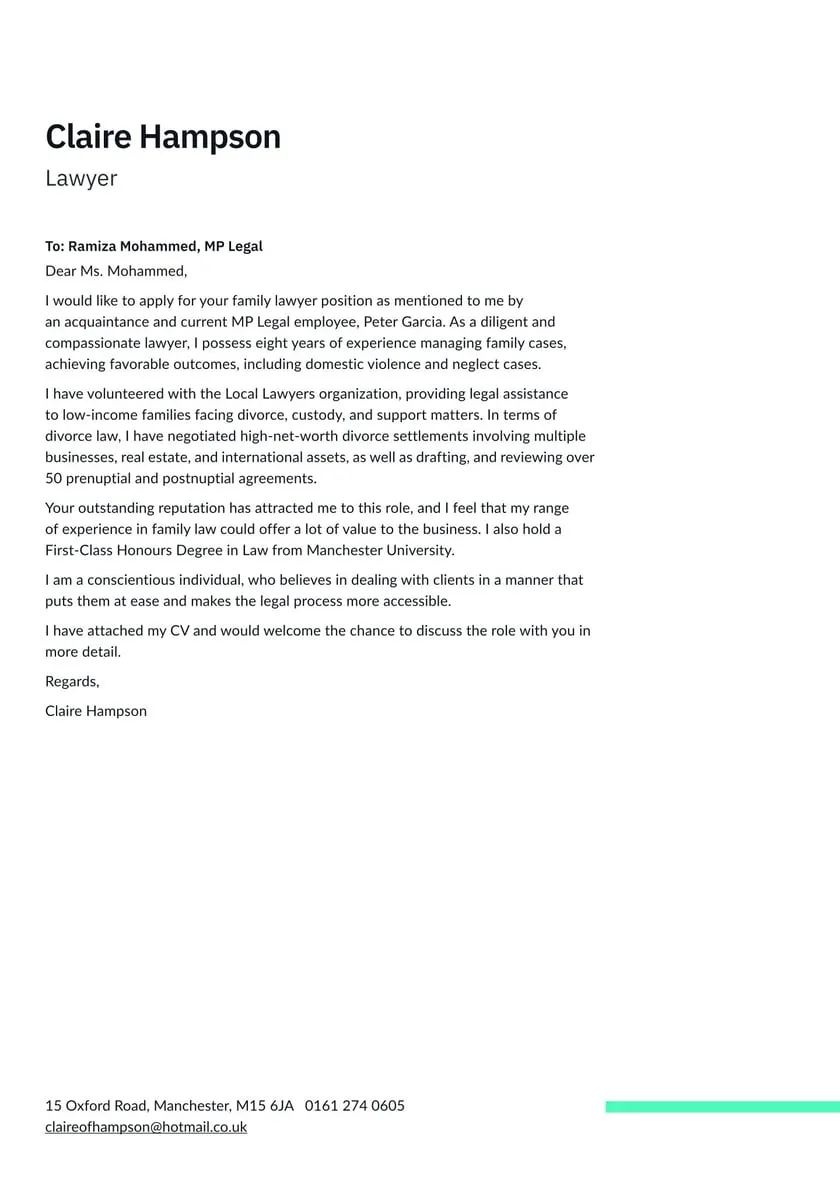
One of the most effective ways to make your cover letter stand out is to quantify your accomplishments. Instead of making general statements about your abilities, provide specific, measurable results. Use numbers and data to illustrate your achievements. This approach adds credibility and demonstrates the tangible impact you’ve made in previous roles. For example, if you improved efficiency, state by what percentage. If you saved a client money, specify the amount. If you won a case, mention the outcome. Quantifying your accomplishments provides concrete evidence of your capabilities and allows the hiring manager to understand the value you can bring to their firm.
Whenever possible, provide context for your accomplishments. Explain the challenges you faced and the steps you took to achieve your results. This helps the reader understand your problem-solving skills and your ability to overcome obstacles. When quantifying your achievements, choose metrics that are most relevant to the job requirements. This demonstrates that you understand what the firm is looking for and that you have a proven track record of success in those areas. Highlighting measurable results also makes it easier for the hiring manager to assess your qualifications and compare your application with others, significantly increasing your chances of making a positive impression.
Secret 2 Tailor to the Job & Firm
A generic cover letter is easily recognized and often disregarded. To make a significant impact, you must tailor your cover letter to each specific job and firm. This requires careful attention to detail and a genuine effort to understand the unique needs and values of the organization. Research the firm thoroughly and customize your letter to reflect your understanding of their work, culture, and goals. This targeted approach demonstrates that you are genuinely interested in the opportunity and have taken the time to learn about the firm. It also shows that you are serious about the position and are not simply sending out a mass application.
Review the job description carefully and highlight the skills and experiences that are most relevant to the role. Use the same keywords and phrases used in the job posting to demonstrate that you meet the specific requirements. In your letter, address the hiring manager directly and personalize your message. Mention specific projects, clients, or areas of law that align with the firm’s practice areas. This personalized approach shows that you have done your homework and are not just sending out a generic application. By tailoring your cover letter, you will not only make a better impression but also increase the likelihood of getting an interview.
Researching the Firm’s Culture
Before writing your cover letter, conduct thorough research on the firm. Understanding the firm’s culture, values, and mission is essential for tailoring your application effectively. Visit their website, read their blog, and review their social media profiles to gain insights into their work environment and the type of individuals they hire. Look for information about their recent projects, awards, and community involvement. This research will help you identify key areas where your skills and experience align with the firm’s needs and values. You can then use this information to craft a compelling cover letter that demonstrates your genuine interest in the organization and its goals.
Pay attention to the firm’s website and other online resources. Look for information about the firm’s practice areas, client base, and any unique aspects of their culture. If the firm emphasizes teamwork, highlight your collaborative skills. If they value innovation, mention your creative problem-solving abilities. By demonstrating that you understand and appreciate the firm’s culture, you can significantly increase your chances of making a positive impression. During your research, you may find unique details to use in your cover letter, such as specific cases they have handled or initiatives they support. Adding these details indicates to the hiring manager that you have done your research and are genuinely interested in the role.
Secret 3 Show, Don’t Just Tell
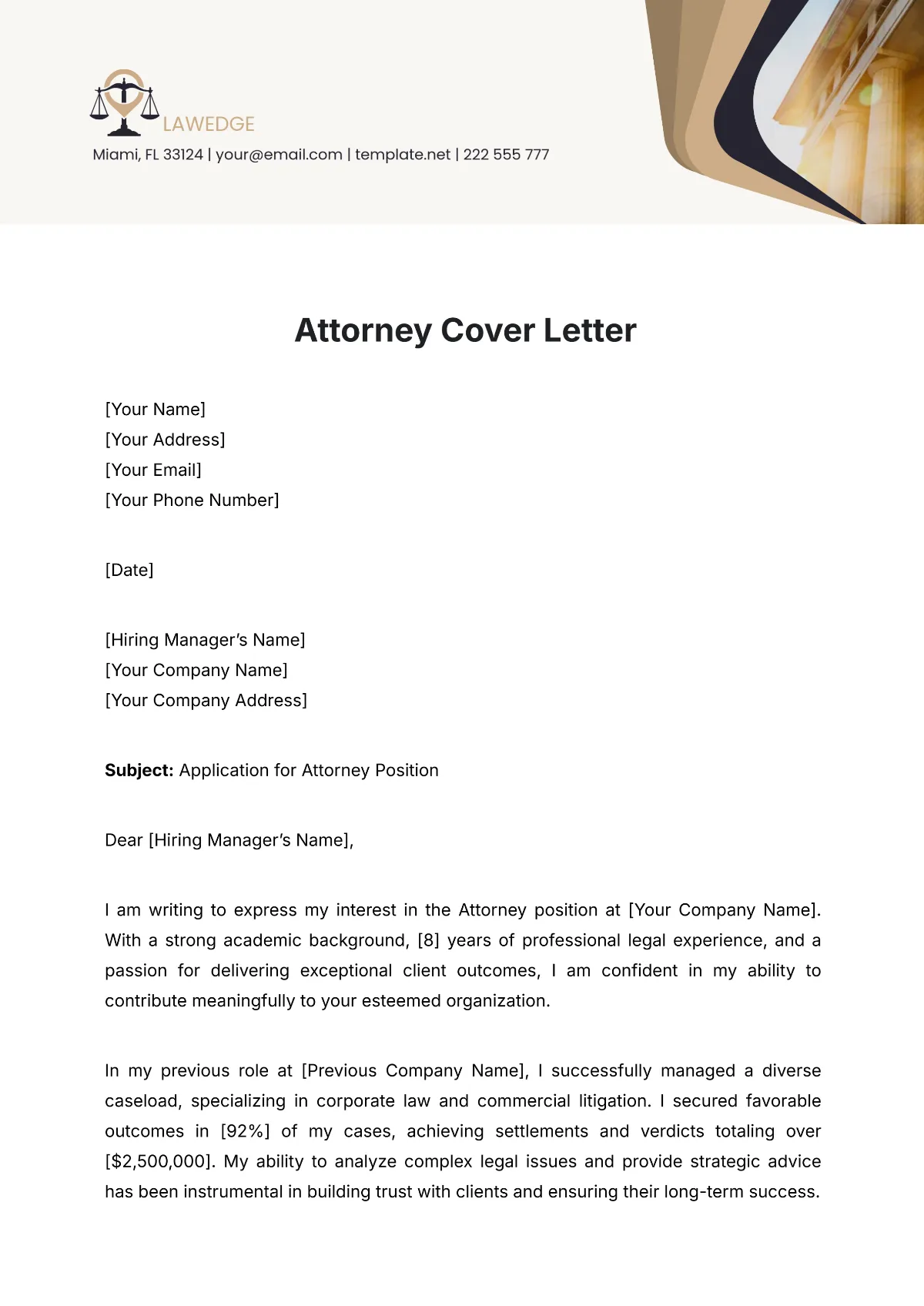
A great attorney cover letter doesn’t just list your skills and experience; it demonstrates them through concrete examples and compelling narratives. Instead of simply stating that you have strong communication skills, illustrate your abilities by describing a time you successfully negotiated a complex deal or mediated a difficult client dispute. This approach is significantly more impactful because it brings your skills to life. It proves that you can translate your expertise into real-world results. It’s easy to claim you possess certain qualities, but backing up these claims with specific examples that show your expertise and achievements sets you apart from the competition.
When crafting your cover letter, think of it as a story. Use the STAR method – Situation, Task, Action, Result – to structure your examples. Briefly describe the situation, outline the task you faced, explain the actions you took, and highlight the positive results you achieved. This structured approach provides a clear, concise, and engaging narrative that showcases your abilities. Be specific and provide as much detail as possible. This will allow the hiring manager to fully appreciate your skills and the impact you can bring to their firm. Moreover, by telling a story, you create an emotional connection with the reader, making your application more memorable and persuasive.
Use Strong Action Verbs
Action verbs are the backbone of a compelling cover letter. They add dynamism and impact to your descriptions, helping you convey your accomplishments more effectively. Instead of using passive language, employ strong action verbs to showcase your capabilities and accomplishments. For instance, use ’negotiated,’ ‘managed,’ ‘drafted,’ ’litigated,’ or ‘advised’ to describe your previous experiences. These verbs add energy and clarity to your writing, making your application more engaging. They paint a vivid picture of your professional capabilities and highlight your ability to take initiative and achieve results. Choosing the right action verbs will make your cover letter more readable and more impressive.
Use a variety of action verbs to keep your cover letter interesting and avoid repetition. Research different action verbs that relate to your field and expertise. This allows you to choose words that best represent your accomplishments and experiences. For example, instead of saying ‘I helped clients,’ you could say ‘I guided clients through complex legal processes, resulting in favorable outcomes.’ Remember, the goal is to make your achievements sound powerful and ensure that the hiring manager quickly understands your contributions. By incorporating strong action verbs, you can transform a simple list of skills into a compelling story of success.
Secret 4 Structure for Success
A well-structured cover letter is easy to read and makes a positive impression. Follow a standard format that includes a professional header, a compelling opening paragraph, several body paragraphs that highlight your qualifications, and a strong closing statement. The opening paragraph should immediately grab the reader’s attention by stating the position you are applying for and why you are interested. Use the body paragraphs to showcase your skills and experience and provide specific examples of your accomplishments. The closing paragraph should reiterate your interest in the position and express your eagerness for an interview. A clear, organized structure will significantly improve your cover letter’s effectiveness.
Ensure your cover letter is concise and to the point. Hiring managers are busy, so aim for a single page. Use clear and concise language, and avoid jargon or overly complex sentences. Break up large blocks of text with bullet points, and use headings and subheadings to organize your content. Proofread your cover letter carefully to catch any errors in grammar or spelling. A well-structured and error-free cover letter demonstrates your professionalism and attention to detail. By following these guidelines, you can create a cover letter that is both impressive and easy to understand, significantly increasing your chances of getting an interview.
Formatting and Layout
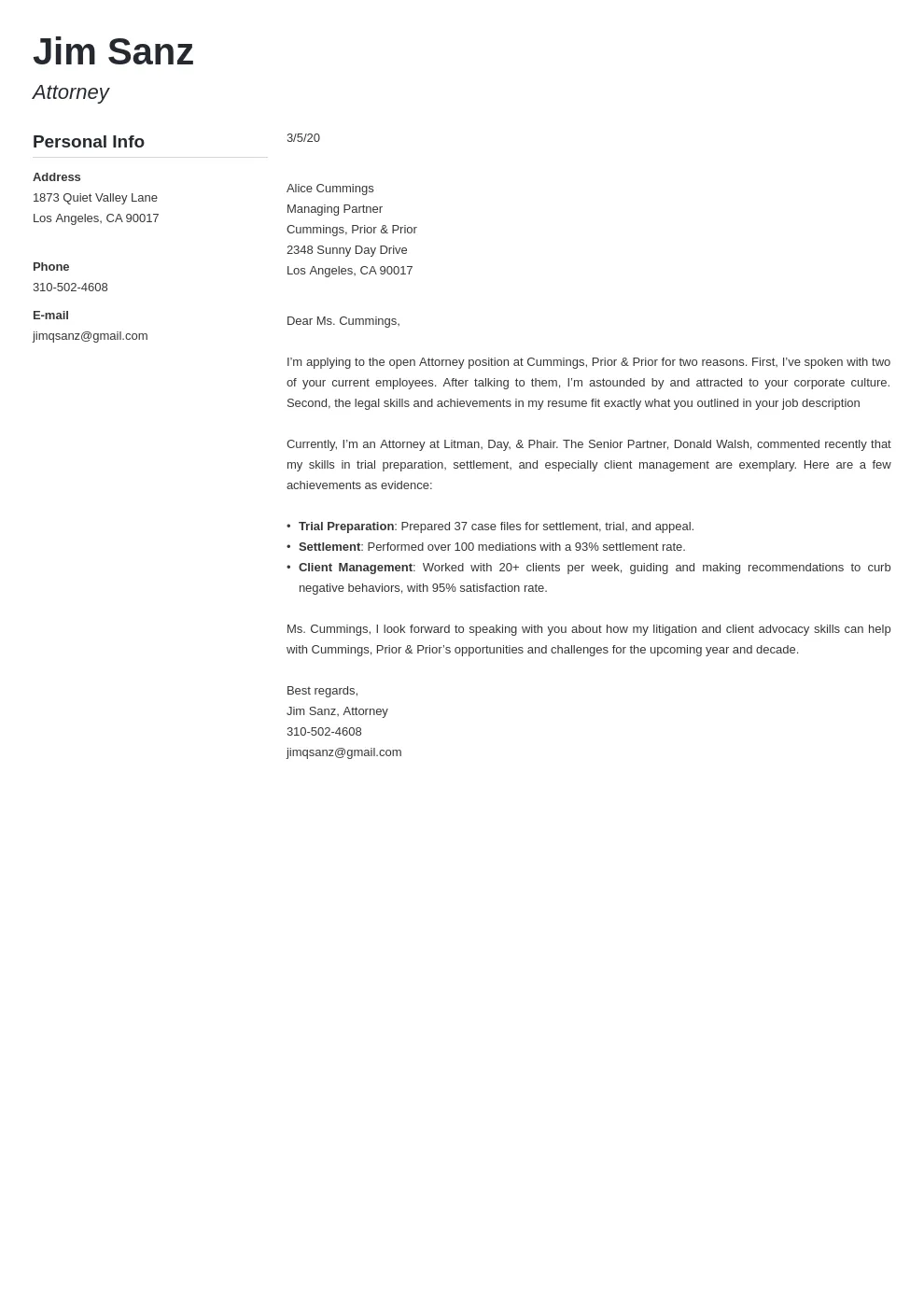
Formatting and layout are essential aspects of creating a professional cover letter. Use a standard font like Times New Roman or Arial, and maintain a consistent font size (11 or 12 points). Use single spacing and 1-inch margins on all sides. Ensure the text is left-aligned and the paragraphs are well-spaced. These formatting choices contribute to the overall readability of your cover letter. A clean and professional appearance conveys your attention to detail and respect for the reader. It is essential to format your cover letter in a way that it is easy to read.
Use clear headings and subheadings to break up the text and guide the reader. Keep each paragraph concise and focused on a specific point. Proofread your cover letter carefully to ensure there are no formatting inconsistencies or errors. Pay attention to details like the correct use of commas, periods, and other punctuation marks. Review the layout to ensure the text flows smoothly and there are no awkward line breaks. A well-formatted cover letter demonstrates your professionalism and commitment to quality, helping you create a positive first impression. Make sure your cover letter is visually appealing and easy for a busy hiring manager to read.
Secret 5 Proofread and Perfect
Proofreading is the final, and arguably most important, step in the cover letter writing process. Errors in grammar, spelling, or punctuation can undermine your credibility and damage your chances of getting an interview. Before submitting your application, meticulously proofread your cover letter for any mistakes. Read it multiple times, paying attention to every detail. Consider reading it aloud to catch any awkward phrasing or grammatical errors. Proofreading is often an overlooked step, but it is vital in making the best possible impression. A well-proofread cover letter shows that you pay attention to detail and have the skills to produce high-quality work.
Ask a trusted friend, colleague, or career counselor to review your cover letter. Another pair of eyes can often catch errors that you might miss. They can also provide feedback on your writing style and the overall effectiveness of your letter. Seek help from professional proofreading services or use online tools like Grammarly to catch any potential mistakes. Ensure that the formatting is consistent and that the layout is professional. Always check for consistency in the font, spacing, and margins. Make sure the tone of the cover letter is appropriate for the position and the firm. By proofreading and perfecting your cover letter, you will be better positioned to make a positive impression and secure an interview.
Common Mistakes to Avoid
Several common mistakes can significantly diminish the effectiveness of an attorney cover letter. Avoid these pitfalls to ensure your application stands out for the right reasons. One of the most common mistakes is using a generic cover letter. Tailor your letter to the specific job and firm, highlighting relevant skills and experiences. Another common mistake is focusing too much on yourself and not enough on the employer’s needs. Show how your skills and experience can benefit the firm. Avoid using jargon or overly complex language, which can be difficult for the hiring manager to understand. These pitfalls can be avoided by attention to detail.
Other common mistakes include making grammatical errors, not proofreading your letter, and failing to quantify your accomplishments. Always proofread your cover letter carefully before submitting it. Don’t make it overly long, a single page is best. It is also a good idea to avoid using clichés or generic phrases that can make your letter sound impersonal. Refrain from including irrelevant information or information that is not directly related to the job. Finally, don’t forget to include a call to action – a statement expressing your interest in the position and your desire for an interview. Avoiding these mistakes will significantly improve your chances of creating a standout attorney cover letter.
Final Thoughts on Attorney Cover Letters
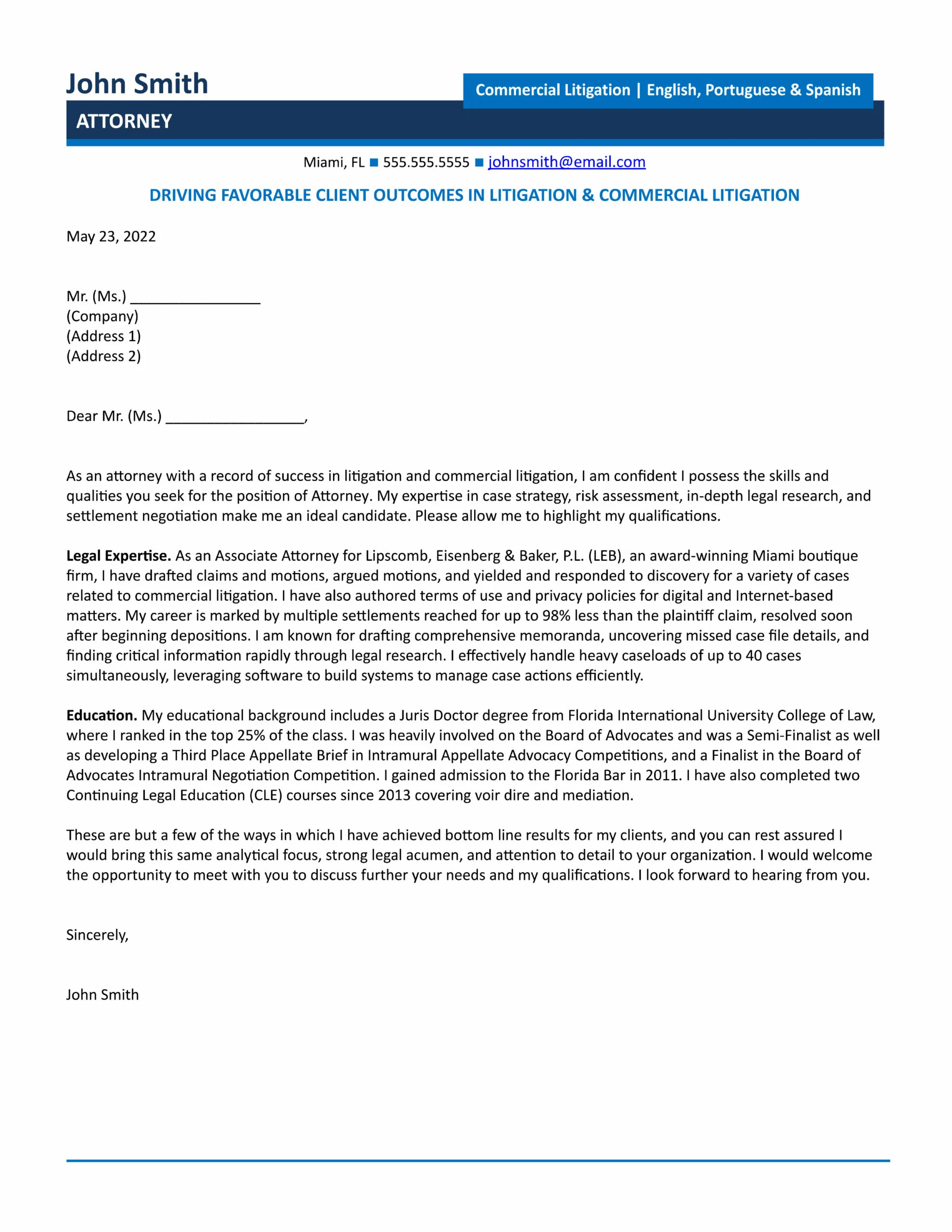
Writing a compelling attorney cover letter is an art that requires careful attention to detail and strategic thinking. By mastering the secrets revealed in this guide, you can create a cover letter that captures the hiring manager’s attention and effectively communicates your value as a candidate. Remember to highlight your key skills, quantify your accomplishments, tailor your letter to each job and firm, demonstrate your skills through compelling narratives, and proofread meticulously. Use strong action verbs and pay close attention to formatting and layout. These strategies will help you stand out from the competition. A well-crafted cover letter is a powerful tool for legal professionals seeking to advance their careers.
As you prepare your attorney cover letter, keep in mind that it’s not just a formality; it’s your first opportunity to make a strong impression. It’s your chance to set yourself apart and to make the case that you are the best candidate for the job. View it as a marketing document that showcases your unique strengths and your enthusiasm for the position. With each cover letter, you have an opportunity to build on your experience, refine your strategy, and refine your skills. Embrace the process, learn from your experiences, and continue to hone your skills. Mastering the art of attorney cover letter writing will be an invaluable asset throughout your legal career.
